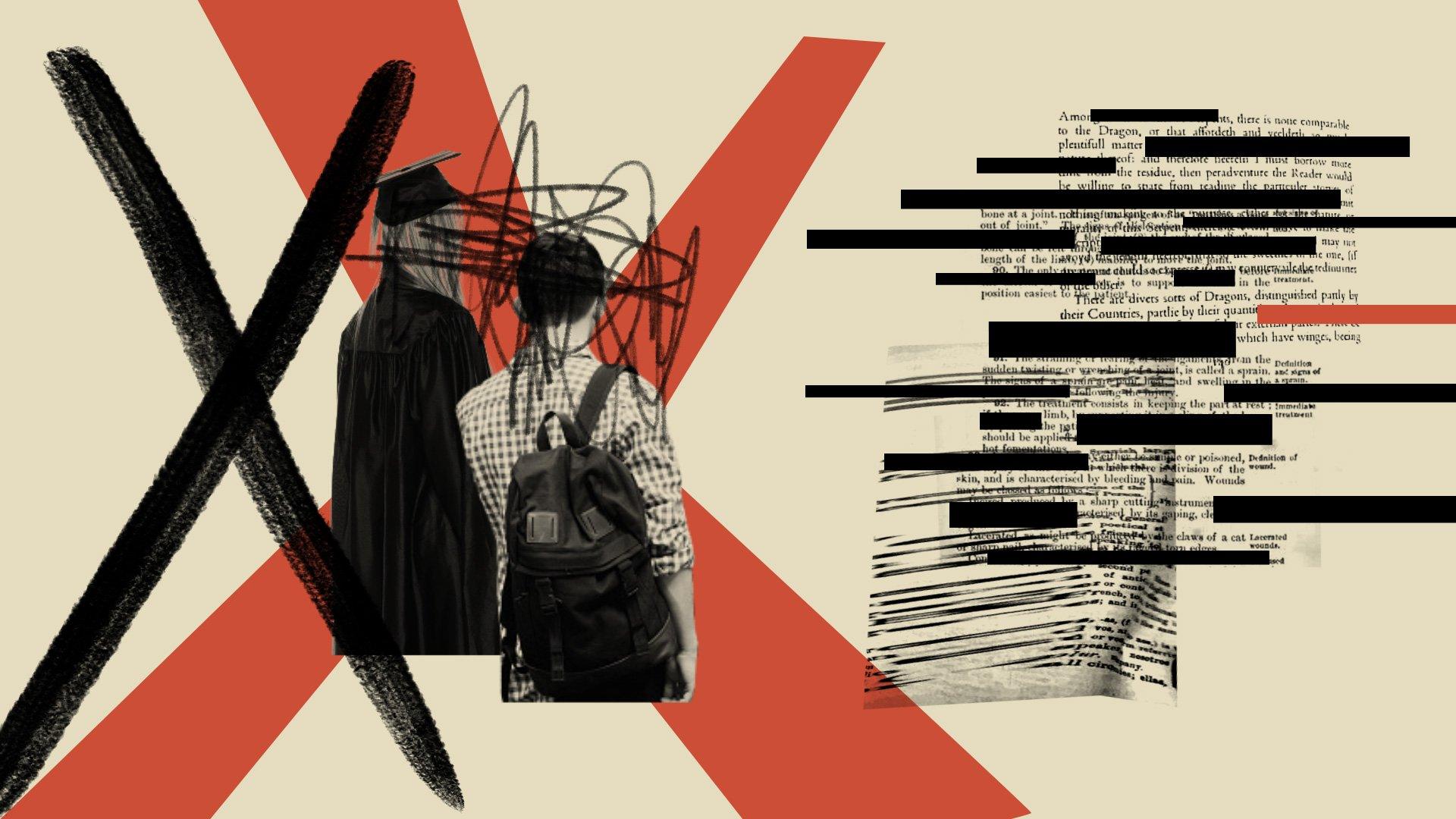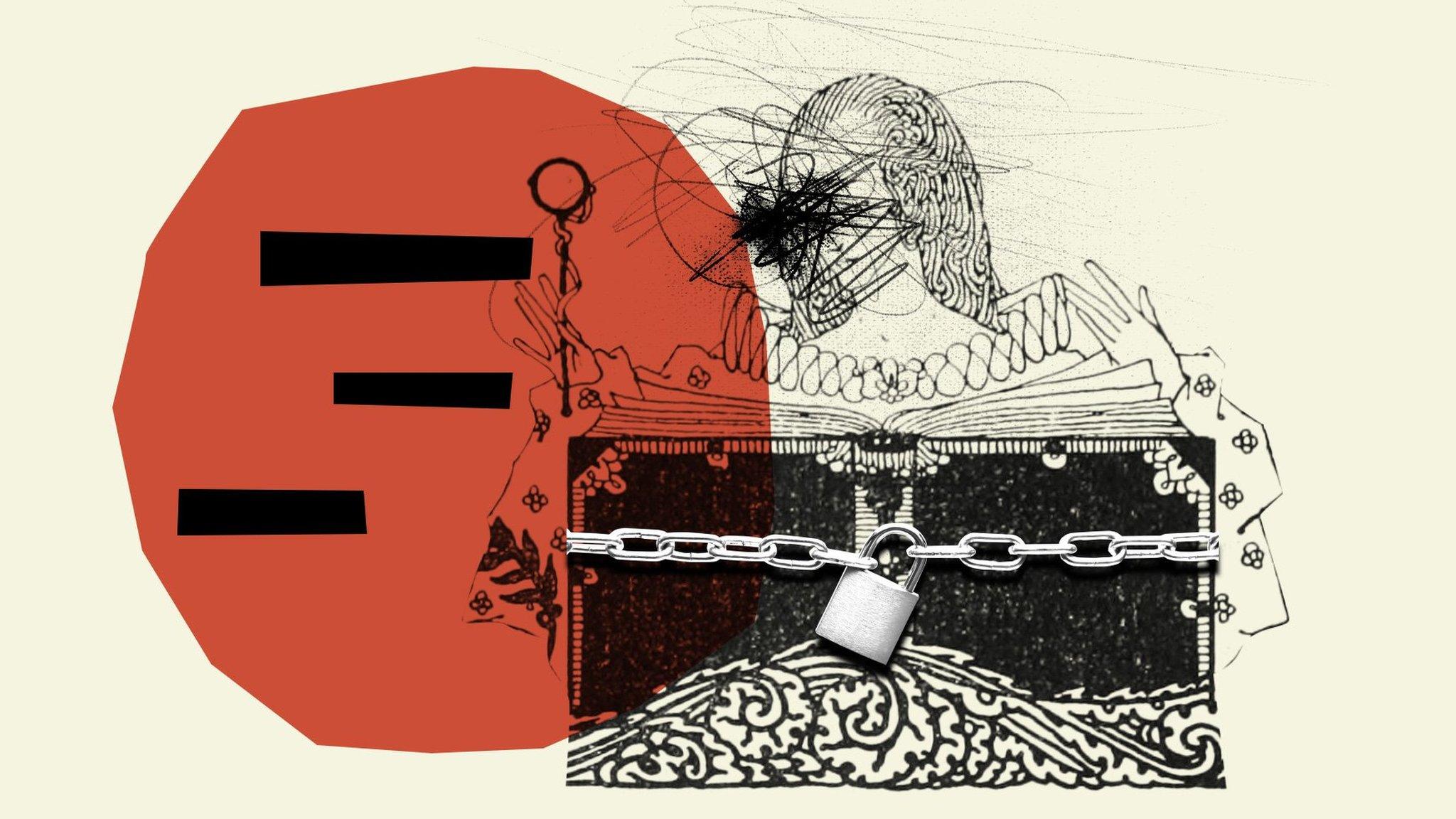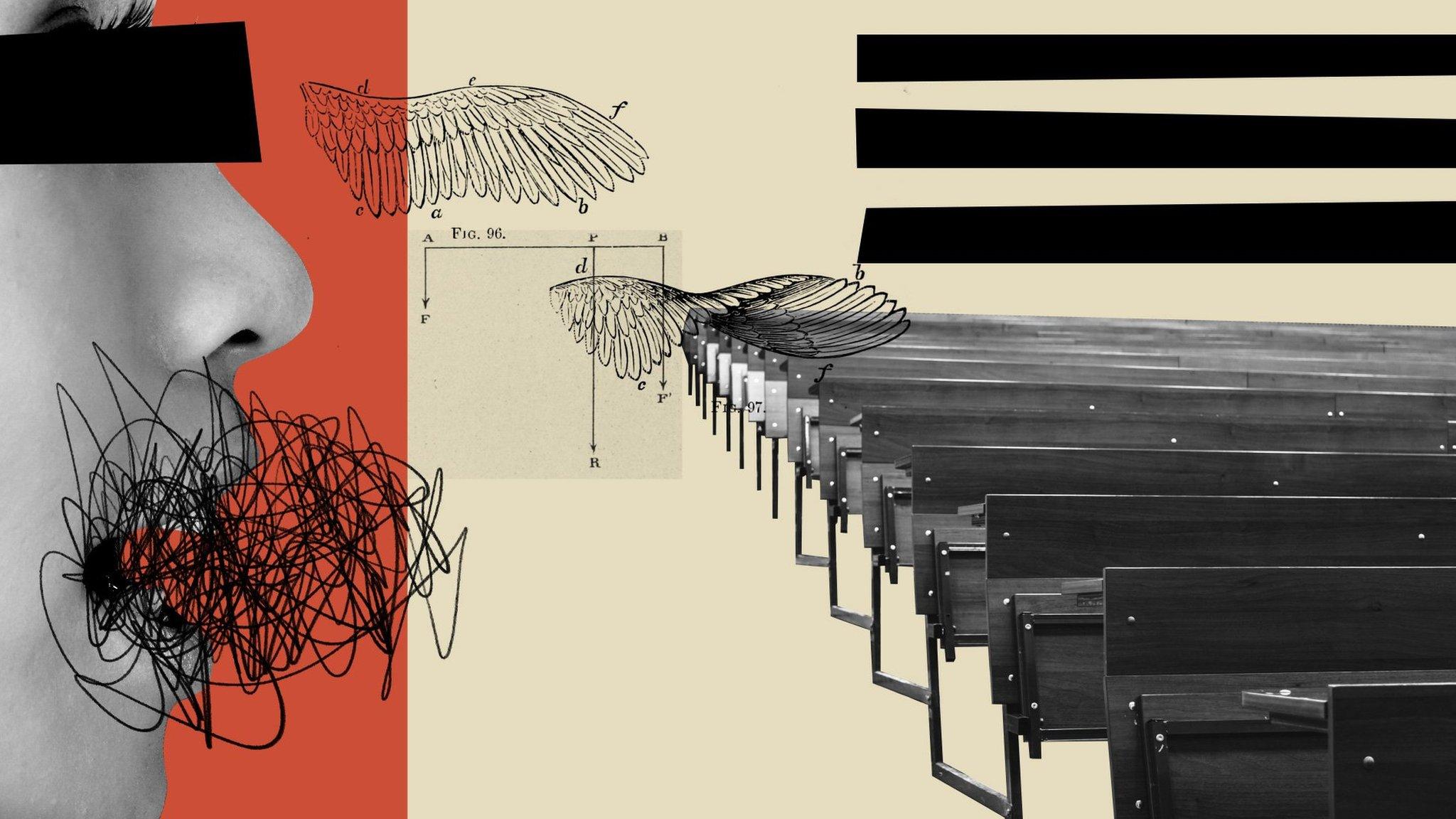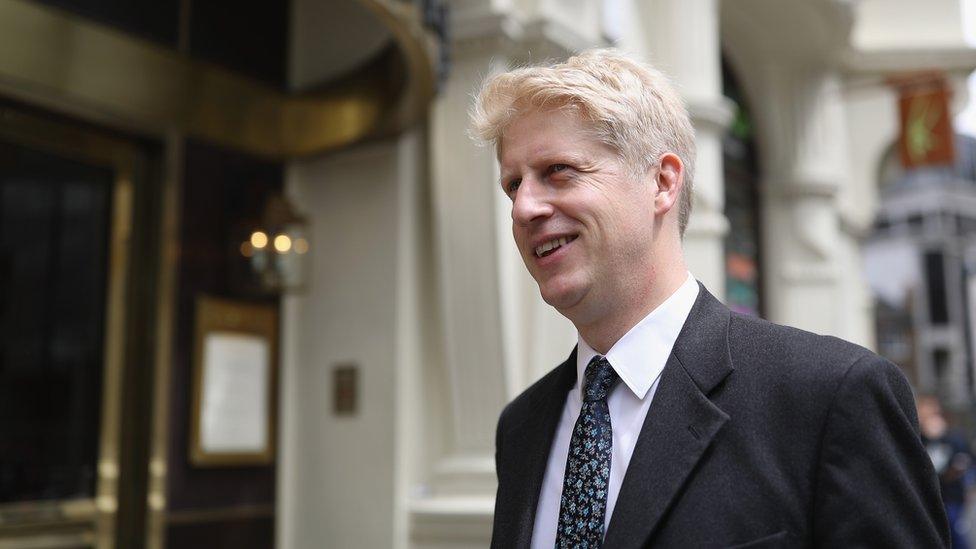Universities: Is free speech under threat?
- Published

Free speech is being threatened at British universities by a culture of offence among certain students, according to critics.
A Parliamentary inquiry has reported, regulator the Office for Students has threatened to fine universities that fail to uphold free speech and the Equality and Human Rights Commission is drawing up guidelines for universities.
A small number of incidents have been held up time and again and debated fiercely. But what evidence is there that challenges to free speech are widespread?
At the end of last year, the then Universities Minister, Jo Johnson, claimed that books were being removed from libraries, "undermining the principle of free speech".
BBC Reality Check asked for evidence of this under the Freedom of Information law. The Department for Education shared letters referring to books by Holocaust denier David Irving being moved from history to another section of two university libraries. Nobody provided evidence of books being banned.
We sent Freedom of Information requests to every UK university to find out about:
changes to courses
books being removed from libraries
speakers being cancelled
From the responses of 120 universities, we found that since 2010 there had been:
Seven student complaints about course content being in some way offensive or inappropriate - four have resulted in action being taken
six occasions on which universities cancelled speakers as a result of complaints
no instances of books being removed or banned
We picked these measures as ones that would reveal restrictions at an institutional level regarding what students are learning.
And of the 136 universities and more than two million higher education students in the UK, the numbers of incidents uncovered is small.

What were the complaints?
At the University of Sheffield, Chinese students complained about a film showing state discrimination against Tibetans in China containing an offensive phrase. It was replaced with a different film, still showing discrimination against Tibetans.
The University of Portsmouth received "several complaints" from students about a presentation on the first dinosaur to be scientifically described. It was named Scrotum humanum (because of its apparent resemblance to human testicles) and an image of a "mammalian scrotum" was included for comparison.
The image was removed from the presentation.
Three universities said they had changed course content because the subject matter had been likely to offend (not as a result of complaints):
At the University of Sheffield, a law lecturer was advised not to use "cross-dressing" as an example of when an injunction might be sought
At Keele University, a tutor stopped teaching a novel that referred to the Hillsborough disaster
At Leeds Beckett University, a lecture on "suicide terrorism" was replaced with "alternative content"
Book banning
Only 11 universities said they had received any complaints about the content of library books since 2010. None of them removed books from their library as a result.
Three universities - Central Lancashire, Surrey and Westminster - received complaints over the placement of the Koran in their libraries. There are principles in Islam around how the the central religious text should be stored and handled.
The Universities of Manchester and Surrey moved David Irving's writing to a different section, while Churchill College, Cambridge says it keeps Mr Irving's writings in its archives, where they are available on request.
No-platforming
Those who fear that free speech is being restricted often point to incidences of students protesting against speakers and, occasionally, events being cancelled.
Many of these events are organised by students' unions, not universities.
"No-platforming" - a policy of refusing to host particular speakers - dates back to the 1970s but the practice has become one of the most heated topics of the current free speech debate.
Six organisations are on the National Union of Students' (NUS) official "no platform list":
al-Muhajiroun
British National Party (BNP)
English Defence League (EDL)
Hizb-ut-Tahir
Muslim Public Affairs Committee
National Action
Critics are concerned that others, not included in this list, are being prevented from speaking for fear of causing offence.
Feminist writer Germaine Greer and LGBT rights campaigner Peter Tatchell both delivered talks despite complaints at their presence.
There have been cases - like that of YouTuber Sargon of Akkad, whose talk at King's College London was interrupted by protesters, or ex-Muslim feminist campaigner Maryam Namazie, who was heckled by some students at Goldsmiths - where speaking events have been disrupted by a small number of vocal students. These were not institutional bans.
It was reported that Warwick students' union tried to block Ms Namazie from speaking, and the decision was then overturned.
But the union told a parliamentary inquiry that this had been caused by an administrative error, which resulted in a risk assessment not being completed.
"As soon as this simple human error was brought to our attention, the correct procedure was immediately followed, the supposed 'decision' reversed and the speaker's talk confirmed," the union said.

Formal complaints
Smita Jamdar, a higher education lawyer who has represented universities, says protests or complaints are themselves a manifestation of free speech in action. "The ideal situation is you would see the event going ahead and protests too," she says.
But the problem comes if anticipated protests lead to events being cancelled, as has happened on a small number of occasions, or if fear of protest puts off people from booking potentially controversial speakers in the first place.
Students' unions are membership organisations that do not have a legal duty to promote freedom of speech, and are not subject to Freedom of Information laws. Because universities do have this duty, under the Education Act 1986, we asked them whether they had received complaints about speakers.
Since 2010, 16 universities have received formal complaints about speakers and nine events in all were cancelled.
The University of Westminster cancelled an event with controversial Islamic cleric Haitham al-Haddad.
Queen Mary's University, London cancelled a speech by prominent professor Tariq Ramadan after he was arrested over rape allegations - which he strongly denies
The University of Liverpool cancelled a 2012 mayoral debate, which was due to include panel representation from the National Front and BNP, because of planned demonstrations that caused "concerns for student, staff and public safety".
What the requests don't capture are internal policies, how they are interpreted and whether they are creating bureaucratic hurdles which may lead to certain speakers never being requested in the first place.
Universities tend to have external speaker policies for any event taking place on campus, even ones hosted by students or unions. For example, the University of Westminster has a policy that it "will offer no platform to those who are intolerant of the free speech of others".
Libertarian magazine Spiked ranks universities, external on how far they are upholding or restricting free speech, using a traffic light system. It believes these policies can shut down critical debate and gives universities amber or red scores for having guidelines for dealing with bullying, bans on transphobic material or zero tolerance to sexual harassment policies.
The NUS argues that, far from restricting free speech, many of these policies are about accessibility, external - helping people from marginalised groups, who don't always get to speak freely, to have their voices heard.
Whose restrictions?
Universities have other legal duties which can come into conflict with their duty to promote free speech. They must have "due regard to the need to prevent people from being drawn into terrorism" under the Prevent strategy - part of the government's counter-terror laws.
Prof Alison Scott-Baumann, at SOAS University of London, conducted a survey of 2,000 students and said her findings indicate that some Muslim students are shying away from inviting certain speakers or having certain discussions in the first place for fear of being flagged to Prevent.
A Department for Education spokesperson said while there was no evidence of widespread censorship, there were some "genuine problems", including the effect of the "complex web of rules and guidance", as well as the behaviour of protestors and student groups.
New guidance is due to be published this autumn.
Small numbers - big problem?
Absence of evidence does not equal evidence of absence, and these figures are not exhaustive.
They may not capture more informal complaints. We don't know whether pressure was being exerted on lecturers and those booking speakers, affecting what people were and weren't willing to discuss.
Trying to quantify that is "trying to prove a negative", says Simon Perfect, a researcher for Christian think tank Theos. How do you capture the instances of speakers never requested, debates never had and material never taught?
Alistair Jarvis, the head of representative body Universities UK, said: "Universities host hundreds, if not thousands, of events each year, among a student population of over two million. The vast majority of these events pass without incident."
As universities attempt to balance their legal duties and accommodate different groups' rights without challenging free speech, there have been some inevitable sticking points over what should be permitted.
Whether or not new guidance can overcome this confusion should soon become a bit clearer.
Illustrations by Jacqueline Galvin
- Published26 December 2017
